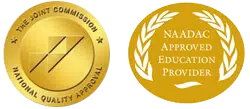If you’re looking at different alcohol treatment options in Massachusetts, congratulations! Fortunately, many treatment options are available to you, but finding the right fit can easily get overwhelming, especially if you aren’t sure what each kind of program involves. Not all alcohol treatment in MA is created equally. However, today we’re sharing what to look for to ensure that your treatment facility is compatible with your needs.
Is the Facility Properly Licensed and Accredited?
Reputable drug and alcohol treatment centers are accredited by The Joint Commission or the Commission on Accreditation of Rehabilitation Facilities(CARF®). Both are non-profit organizations that base their accreditations on the performance standards of each facility and its value, quality of care, and results for clients. State licensing of a treatment facility differs from CARF® accreditation; each body evaluates different things.
Alcohol treatment centers must be certified in order to advertise on third-party sites, like Facebook or Google Ads. Therefore, only legitimate, quality treatment centers are allowed to advertise services on these channels, providing an extra layer of client protection.
Verify Clinical Staff Licensure and Credentials
The treatment team at your alcohol rehabilitation facility should be properly licensed and certified to provide drug rehab programming, meeting nationally recognized professional standards for their position. Clinical rehab nurses, for example, should be trained to work in an addiction setting. Your counselors should also be certified in addiction services and recovery. Specific staff credentials to look for include:
- Licensed Alcohol and Drug Counselor (LADC)
- Licensed Professional Counselor (LPC)
- Certified Addictions Counselor (CAC)
- Certified Co-occurring Disorders Counselor (CCDP)
Does the Facility Offer Multi-Disciplinary Care?
A multi-disciplinary approach to addiction looks at the person as a whole, treating not just the physical addiction but the underlying reasons why the person became addicted. This could include diagnosing a mental illness or working through repressed trauma. Each treatment team member should be licensed to practice in their own discipline – be wary of facilities with a single “jack of all trades” counselor.
Typical multi-disciplinary teams include:
- A medical doctor (may specialize in addiction medicine)
- Psychologist
- Psychiatrists (often able to prescribe medication to ease alcohol cravings)
- Chemical dependency counselor
- Nurse (may be trained in addiction treatment)
- Nutritionist
- Wellness Specialist
- Spiritual care counselor (may not be in all facilities)
Many multi-disciplinary treatment facilities use evidence-based practices for treating addiction. That is, the approaches they use have been proven effective by evidence, in both clinical studies and with success from the clients themselves.
Is There Aftercare Support? How Successful are Past Clients?
Post-rehab support is critical to helping people achieve lasting sobriety. Early recovery is hard. Physically, your body is healing from months or years of alcohol abuse. Emotionally and mentally, you are making changes in your life that can be scary, and you may face the emotions you used to dull with alcohol. A good support system can encourage you to take sobriety one day at a time and help you when you’re tempted to drink again or in a triggering situation.
And, don’t be afraid to ask about the program’s success! Facilities that are on the up-and-up will gladly provide you with quantified information about their treatment success rates.
Do You Need Help For Your Alcohol Addiction, But Aren’t Sure Where to Start?
We can help. Baystate Recovery Center offers several levels of alcohol treatment options, and our compassionate counselors will explain the details of each one to you. Contact us today to learn what kind of treatment is right for you.
Baystate Recovery Center, a clinically Infused 12-Step Treatment Center for Drug and Alcohol Addiction, was founded by two partners in addiction treatment services, John Checchi and Michael Wilson.



